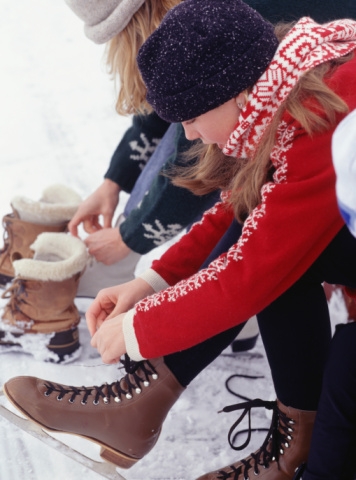I remember one time, when my kids were six, going ice skating at a new rink with my sister Drew, her daughter Courtney, and my triplet sons. The excitement of a new rink and lots of kids zipping around provided for a lot of great fun and laughs, but ended, unfortunately, in an accident and a terrifying trip to the hospital, the memory of which is still vivid.
As we laughed and talked in the stands, Drew and I kept our eyes glued to our kids as they skated in a little pack. I can play over and over in slow motion Courtney's accident: how her skates seemed to fly out in front of her, sending her falling back hard, hitting her head on the ice. My sister and I gasped and look at each other as we made our way to the ice. Courtney was still down and holding her head. "Oh, my God, Courtney are you ok?", my sister asked over and over. Courtney was not okay.
Thank goodness Drew is a nurse and realized immediately that Courtney needed to go to the emergency room. In fact, I realized as soon as Courtney began asking the same questions over and over that she was seriously hurt. An hour later, the doctors at the hospital in Boston told us that she had suffered a very serious concussion. It took many months for the symptoms to disappear.
Years later, my son Spencer suffered a concussion when he, his brothers, and cousins were snowboarding in New Hampshire. All the kids came down the mountain, found us and in unison declared that "something is wrong with Spence." He had fallen on the ice and hit the back of the head. A trip to the ER confirmed that he, too, had sustained a concussion.
Could anything in the concussion "tool bag" have prevented these accidents? No. While kids who snowboard or ski should always wear helmets to protect against skull fractures and serious traumatic, life-threatening bleeding in the brain (the kind that led to the death of actress Natasha Richardson, for example), they don't prevent concussions. Could one of the new iPhone concussion apps have helped? No. In these emergencies no one has time to take out an app, and they are for helping to diagnose a concussion, not preventing them. How about baseline neurocognitive testing?
Again, neuropsychological baseline testing wouldn't have prevented the concussions Courtney and Spencer suffered, but they undoubtedly would have helped in post-concussion management, especially in determining when it was safe for them to be back on the slopes or skating on the rink. While the use of computerized neurocognitive testing has increased dramatically in recent years among high school athletes playing team sports, like football, soccer, and lacrosse (use of the Immediate Post-Concussion Assessment and Cognitive Test has become so widespread that many think of it as being an "ImPACT test"), perhaps kids, like Spencer and Courtney, who weren't playing team sports but are participating in winter sports such as curling,skating, skiing, snowboarding or sledding, in which head injuries are common, should have baseline tests too, prior to hitting the slopes or the rink.
My advice to parents, then, is to consider getting a baseline test done on your child before they strap on skates, buckle up their ski boots, or hop on their Flexible Flyer this winter. You never know when those results might come in handy.









